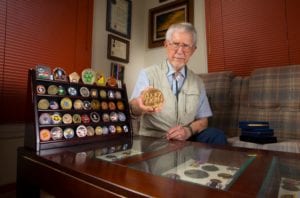BY JAMES SAVAGE
University of Louisiana at Lafayette
Editor’s note: The following appeared in the Fall 2018 issue of La Louisiane, the University of Louisiana at Lafayette’s magazine. Find a digital version of the story here.
James Bollich has lived every day, and more than a few nights, of the last 76 years with memories of Bataan.
The Philippine peninsula fell to Japanese forces five months after the United States entered World War II. Bollich was among 76,000 American and Filipino defenders who retreated to Bataan, a finger of land on the western edge of Manila Bay, in a last-ditch effort to hold the islands.
Surrounded and without reinforcements, “we ran out of everything,” Bollich recalled in an interview with La Louisiane, the University of Louisiana at Lafayette’s magazine. “We had to kill and eat cavalry horses. After those were gone, we ate a few mules. By that time, we were completely out of food.
“The Japanese brought in new troops. That’s when our general decided to surrender. We were in no shape to do more fighting, and it would have been slaughter if he hadn’t.”

The Bataan Death March followed. It claimed at least 10,000 lives. Japanese guards beat and starved prisoners, and executed captives who collapsed or attempted to get water.
Untold others died in prison camps, but Bollich survived. In May, the 97-year-old received the Congressional Gold Medal, one of the highest awards the U.S. government confers on civilians.
The Eunice, La., native left Southwestern Louisiana Institute in August 1940 to join the U.S. Army Air Corps. After more than a year of training, he arrived in the Philippines 18 days before the Dec. 7, 1941, Japanese attack on Pearl Harbor, Hawaii, brought the U.S. into World War II.
By April 1942, Bollich was a prisoner. His ordeal lasted 40 months. Before forcing captives to march 100 miles to Camp O’Donnell, a former military facility converted into a prison, the Japanese first stripped internees of valuables, Bollich said.
“If anybody had a watch, a wallet, dog tags, mess kits, they took everything we had. And once we had nothing left to steal, that’s when they started beating on us.
“They didn’t give us food or water. Every community had an artesian well next to the road. And it got to the point, around midday of the second day, that we figured they were trying to kill us all. So, we were going to get water whether they wanted to give it to us or not. The minute we left the road, the Japanese would start shooting. And if you were lucky, you got a little bit of water and got back on the road. If you were unlucky, you died right there.”
After walking for five days, Bollich arrived at Camp O’Donnell, where captors made him dig graves for the 20 to 30 prisoners killed daily by malnourishment and disease.
“I probably dug graves for four, five, six weeks. That place was just dying bodies all over, open latrines, and everywhere you looked, these big flies. If one touched what you had to eat, you may as well throw it away, because if you caught dysentery, you were going to die.”
Later, Bollich was sent by ship to a prison camp in Manchuria, in northeastern China. The voyage lasted 32 harrowing days.
“We were just packed in. Unfortunately, some of the guys had dysentery, and at night, they’d shut the hold. It was dark and hot. They were screaming and cursing and praying. It was just unbelievable. That, to me, was much worse than the entire length of my POW experience.”
Bollich remained in Manchuria for the remainder of the war. Soviet forces liberated the camp in August 1945, and Bollich returned to Eunice to discover his two older brothers had died serving in Europe. The following year, he re-enrolled at SLI, but his wartime experiences haunted him. Even today, more than three quarters of a century later, dreams occasionally awaken him.
“I dream I am across a big ocean, by myself, in the jungles. And I know I have to walk for days and days and days and miles and miles and miles before I get to where I want to go. And in my mind, I think, gosh, I thought I did this already.”
Bollich graduated from SLI in 1949 and worked more than 35 years as a petroleum geologist. He published his memoir, Bataan Death March: A Soldier’s Story, in 2003.


